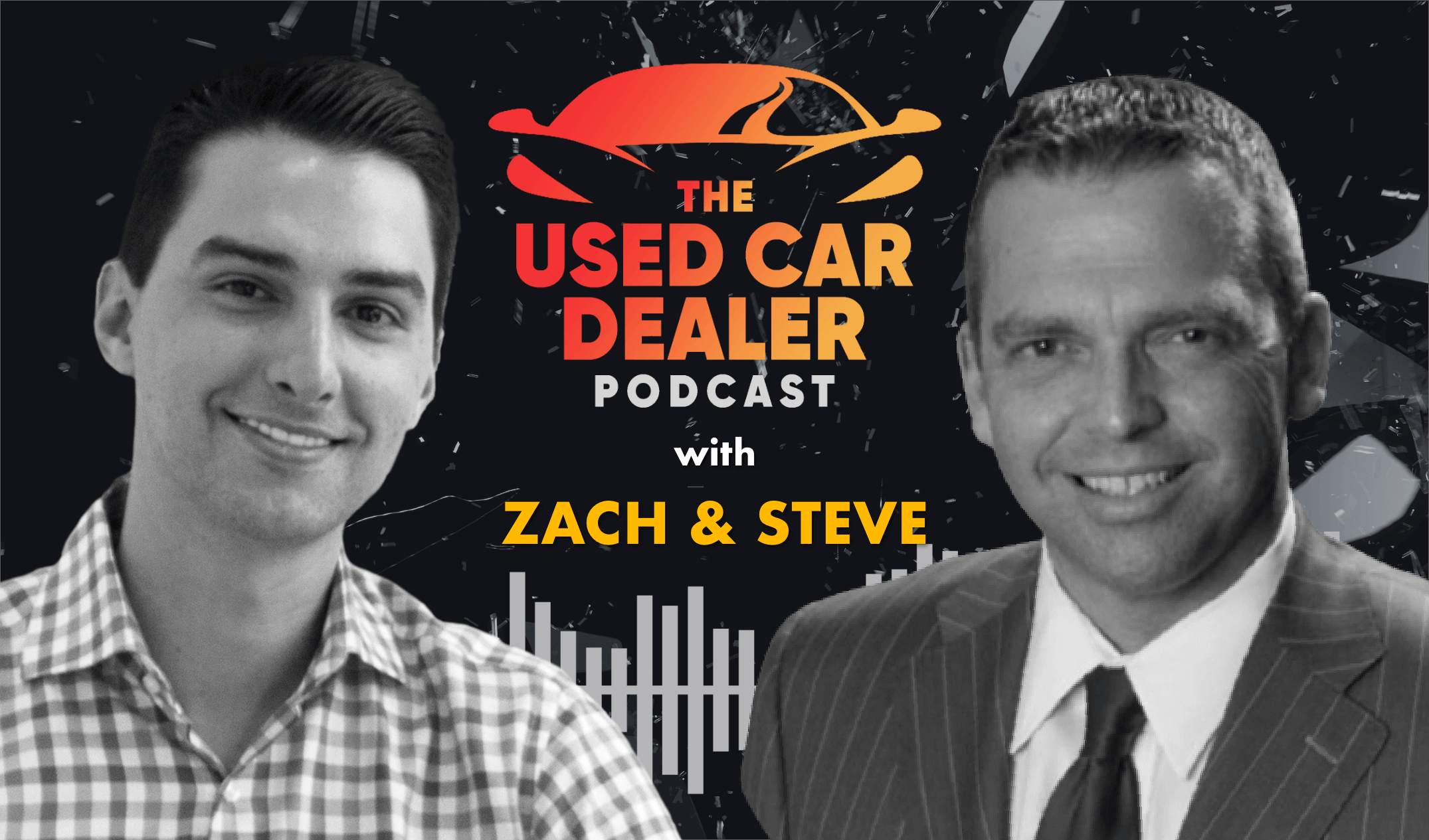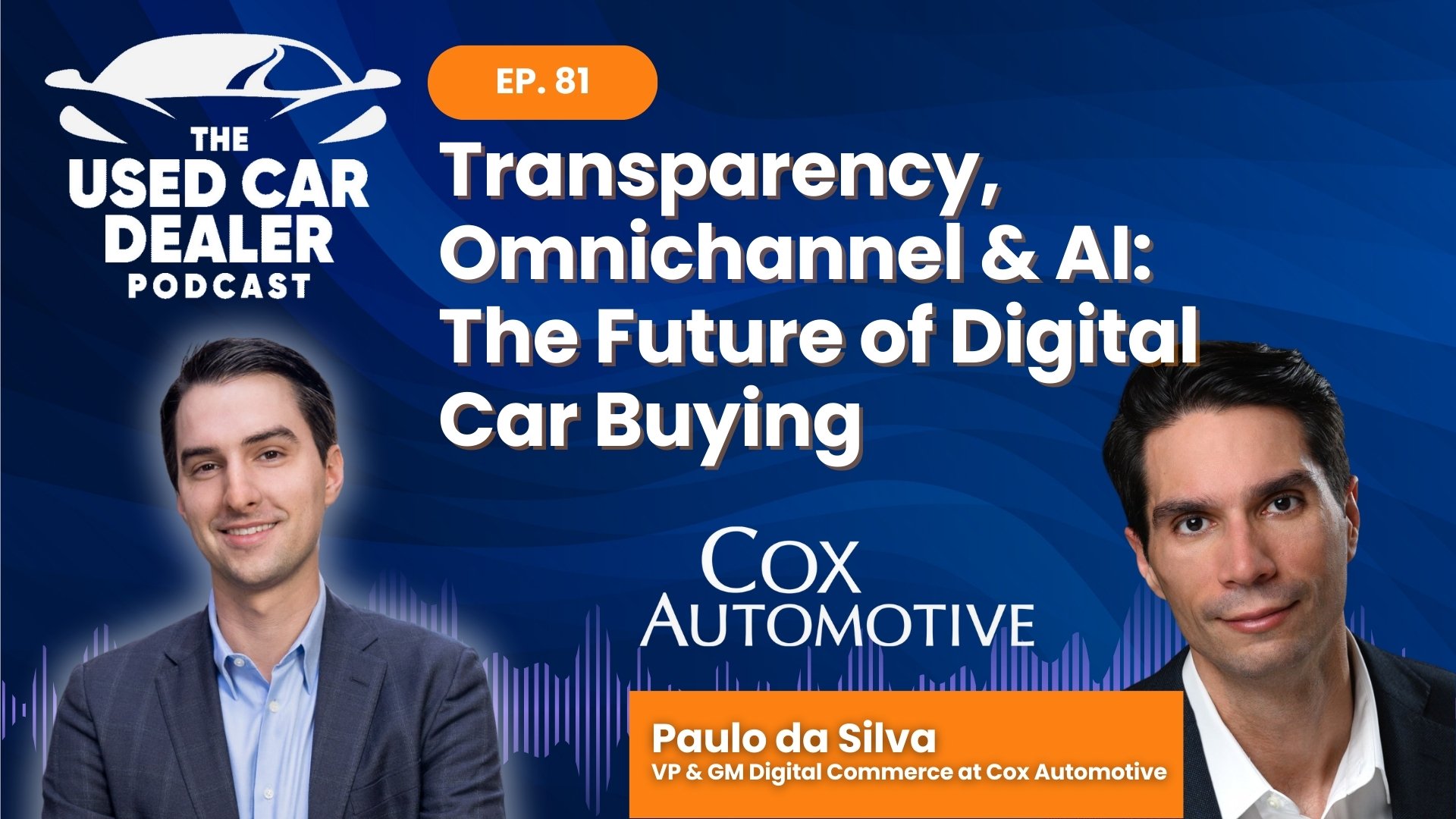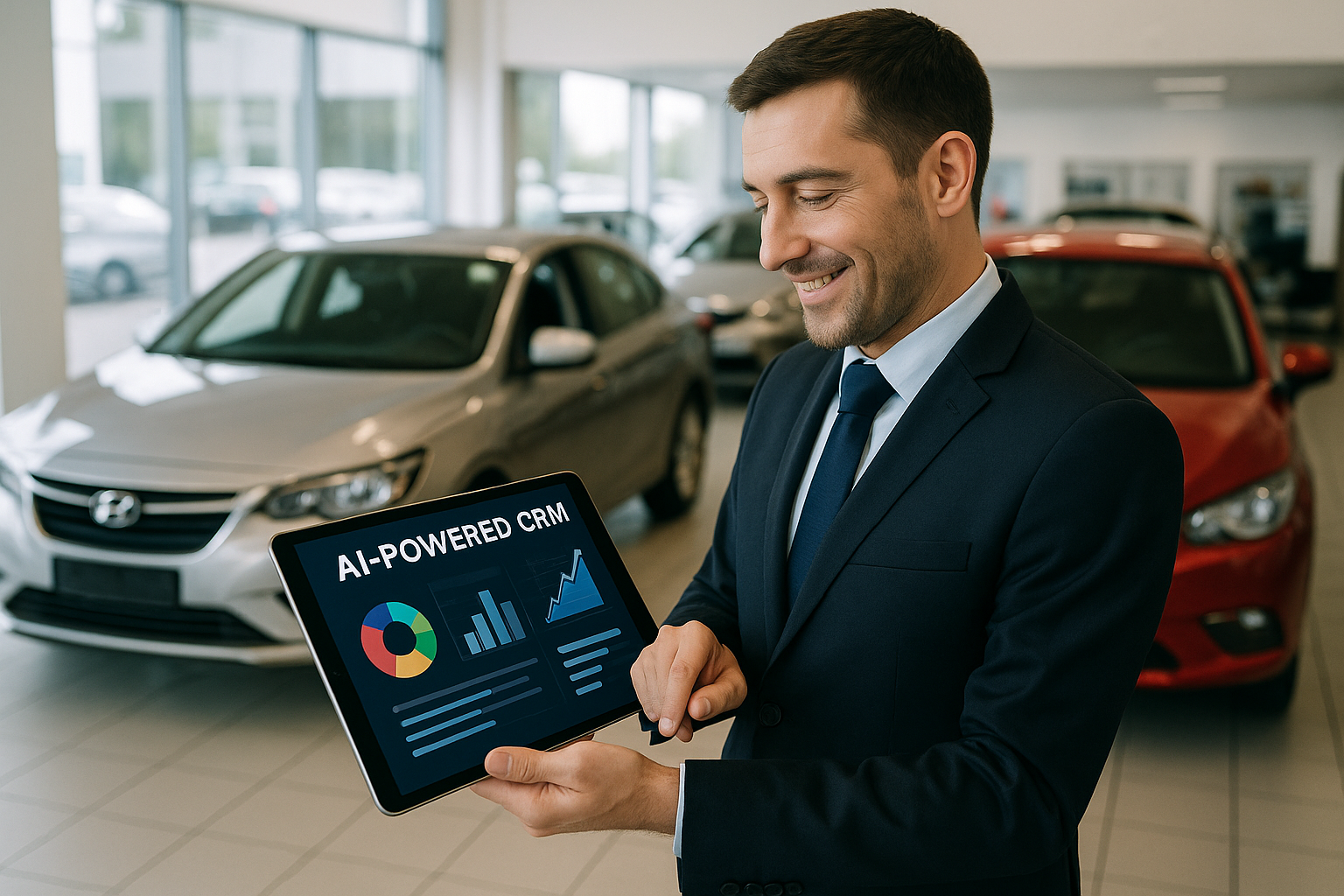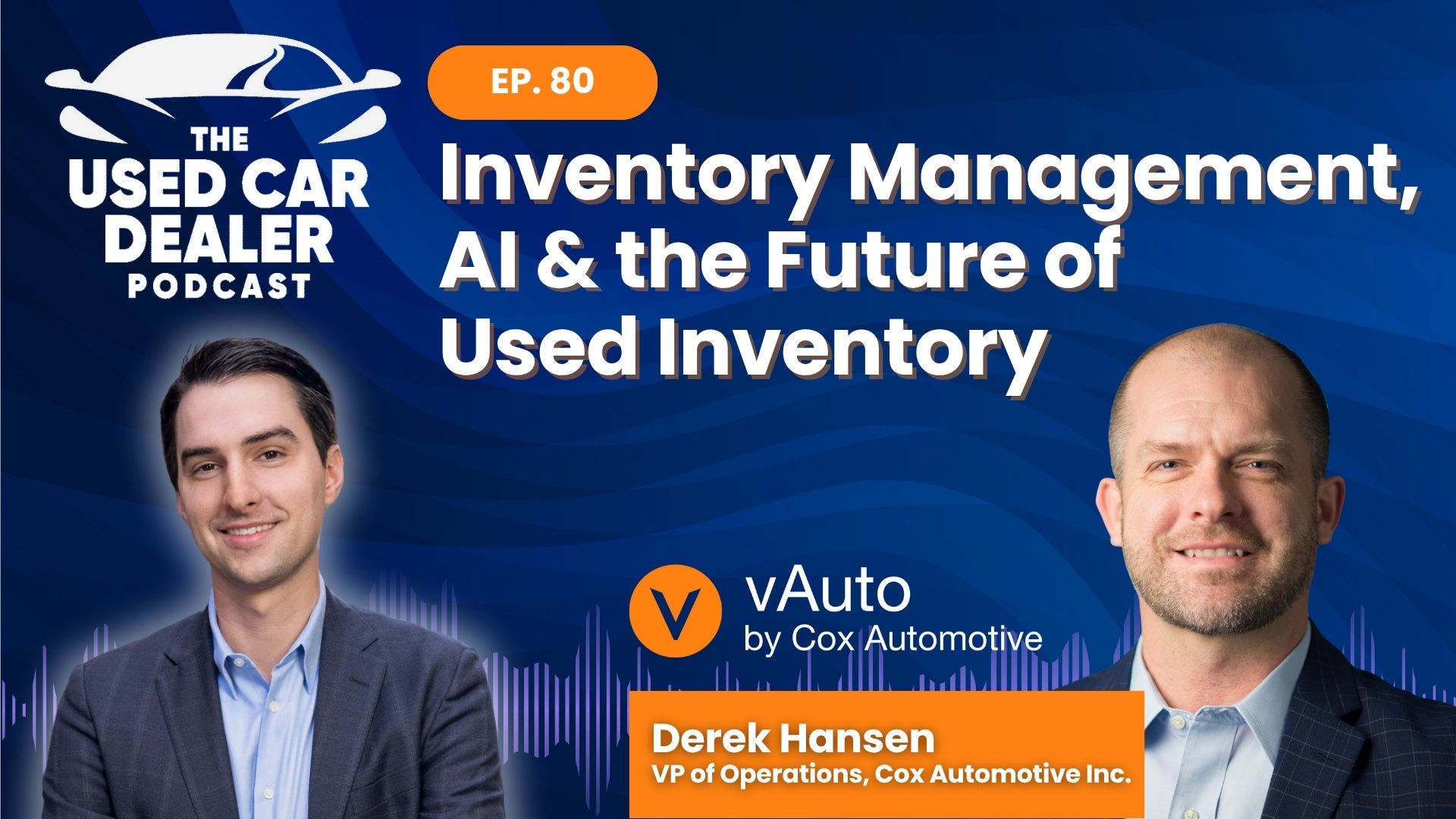In this blog post, we have transcribed the UCDP interview with Michael Greer in written format. You can listen to the original podcast here.
Zach: Hello, it’s Zach here and we have our first automotive Used Car Dealer guest on the podcast today, Michael Greer who’s the owner-operator at Direct Deal Auto, thank you so much for joining the podcast today, Michael, how are you doing?
Michael: Good, how are you?
Zach: I’m doing excellent and we also have Steve on the podcast today. Steve, it’s been a while, how have you been?
Steve: I’ve been terrific, just helping dealers get their pipelines under control, helping them every day to figure out this used car marketplace, it's quite a battle ground out there today and I look forward to hearing what Michael has to say.
Zach: So, Michael to get things started, tell us about how you got into the car business and how long you’ve been operating your store.
Michael: So, I got into the car business back in 2007, actually, as an intern working in a Mercedes dealership in Portland, Maine where I’m originally from. And I have been involved in the car business prior to that, just on a different scale. So, I actually first got into the car business when I was in my early teens working in an auto detail shop that was in town.
And I grew up in a very small town and a remote part of Maine and worked out to be experienced driving all different cars, picking up, delivering, working on everything. And I really decided at that time that it’s a career path that I wanted to take. Getting into actual automotive sales and the internship really cemented that and started my interest in the car business starting right around that year.
Steve: Okay, well it’s been a rollercoaster of a year for dealers, Michael. And talk to me about what you’ve observed from your lens and the way consumers have interacted and purchased vehicles from you.
Michael: So, we saw an initial decline in the market and the wholesale market dropped off and the retail market dropped off right when this shutdown started to affect the state that I’m in, which is Florida. And I know from talking to a lot of my other dealer friends and friends who are also out there, that they told me exactly the same experience. And it’s something that the market has come back a little bit over a period of time and it seems like every month it's getting a little bit more steady, a little bit busier and it's something that is heading in the right direction.
And I think that next year really is the opportunity for a lot of consumer durable goods and just large expensive, big-ticket items that consumers are gonna go out and start purchasing again and regardless if there’s any stimulus package or anything like that. I think that next year we’re really gonna start moving into purchasing big items. And I know that that’s what we’re starting to already see, the local market here in South Florida, move in that direction.
Zach: So, Michael, how has your floor plan been impacted with everything that’s been going on with COVID19 and the pandemic, and also, how has the way you purchase inventory changed during the Pandemic?
Michael: So, the initial reaction to floor plans is we used multiple floor plans like a lot of small dealers are doing. And we own some of the cars outright ourselves and some of the more, I would say, higher risk tolerance floor plans were initially the most restrictive, which kind of surprised me at the beginning of this and they cut our floor line dramatically, basically down to whatever we had on the lot and that was it. So we couldn’t purchase anything more and that was an overnight change with no warning and then the plans with the less risk tolerance, those were the ones that stayed very consistent and they stayed with us which was pretty much the opposite of what I had expected. And the purchasing, that changed fairly dramatically because I had to try to scope out a little bit cheaper of a unit to try to fit what the market was actually buying at that time. And wholesale prices were very low for a period of about a month and a half. So, it made it very easy to actually purchase inventory when you have no idea if you’re gonna sell through it or not.
So, I made the right decision and actually ultimately ended up buying a lot of really good units right when the market sunk, and then I got them in, got them reconditioned right as the market turned back around. And then wholesale prices just ended up going through the roof and interestingly enough, I ended up selling a bunch of those cars on some of the wholesale websites for more than I would’ve actually gotten at retail, which I couldn’t complain about. I had to take the deal and move on to the next car.
Steve: Can you talk to us a little bit about the impact that technology has had on the way your dealership operates?
Michael: Yeah, so we’re a little bit more technology-based than the average small store that I’ve been in or even some of the medium operations. And a lot of our technology is gonna be based and more centric around what the big stores do and that’s primarily what my background is: franchise, new car, highline and exotic. And a lot of the software that we use is either exactly the same software and that’s the big name providers out there or it’s something that’s fairly similar and it might be stripped down for less money because I just don’t need all the features, I don’t have a hundred cars in the lot.
So, that’s one thing that plays a big advantage in our market presence, being able to price our cars correctly, appraise our cars correctly and then make sure that everything is consistent from car to car and we can actually track all the expenses and then sell the car through and make sure that we’re tracking the customer leads where they’re coming from, where we’re spending advertising dollars, where we’re getting a return on the investment and where we’re not. And then things as simple as how many times have we followed up with a customer, how many phone calls, how many text messages. So, all of that plays into technology.
Zach: And a follow up question to technology, what do you think are the three most important software solutions that you use to run your dealership?
Michael: So, one of the absolute most important pieces of software that I found in the franchise world, and I have a cheaper version of it, that I’ve had on at this store (because the main full-scale version is big big money) is a vAuto product called Stockwave. And the full provision product is what most of the big stores are gonna use. That’s a lot of money, it doesn’t make sense for the number of units that I’m doing so Stockwave has been a simplified version of it that you can do vehicle appraising on.
It’s not really designed for that but it is a tool that you can use for that. It’s got all the book-outs, all the valuation, everything’s on one screen. And then it allows me to see the market, I can see both the wholesale and the retail and then I can actually see on separate log-ins other auction companies because vAuto is owned by Manheim.
So they’re gonna primarily push that type of product but it allows you to really buy the car right and sell the car right, and then track exactly how many days should it take me to sell the car which is definitely a big thing that I look at whenever I’m buying merchandise is that I wanna know what I’m buying it at, how much am I gonna put into it, what’s my holding cost, and then how soon can I expect to sell it and that’s something that I think a lot of stores don’t look all the way through the sales process and I know from working at the big stores that even those ones don’t look at the selling time. That’s usually where they lose it and that is one of the best pieces of software that I found on the market. I’ve tried a lot of stuff, that’s consistently one of the best.
Carfax is another great tool that I recommend over the competitor, which is Autocheck. And Carfax is a lot more money but it's worth it, both for the advertising portion of it and then also for the history reports that you’re gonna actually show the consumer and sow confidence in the product that you’re selling. And one of the things that we’ve learned with that product is that we don’t actively pursue cars with title issues on them at this store. I do get them in on trade every now and then and if they were rebuilt correctly, I will sell it as a retail unit.
However I’m usually asking for the lowest price in the market for that comparable car and interestingly enough, Carfax is generally where the buyer comes from on those cars which is exactly the opposite of what you would expect. So that’s just the unique feature there.
And I would say that for the CRMs, you know your product Selly is definitely the best small CRM that I’ve used on the market and it has a lot of the same features that I’m used to using at the franchise groups with the big incredibly expensive CRMs and some features that I haven’t even seen within those. So some of the features are actually better than them. So that’s a great kind of round-up of the top three software that I really like to use on a daily basis.
Zach: Well put, Michael and what’s your unique why buy from your store value proposition to the consumer?
Michael: So, my vehicles are reconditioned to a significantly higher standard and it’s similar to the way that I use to recondition certified cars that would be 2,3,4,5-year-old cars at a manufacturer store and we’re actually checking the systems, the components, the fluids. And I am actively, as the owner, driving these cars home, which is about a 30-minute journey, mostly highway for me every single night rotating through all the cars and making sure that I’m not selling cars with check engine lights, check airbags, check tire pressure and making sure the systems work, the buttons work, everything works on it.
And that’s a very unique concept that we see on the market that I’m in here, because most of the other independent dealers are selling cars that need a significant amount of mechanical and bodywork. And my cars are turnkey. I’m selling stuff that’s done. You can get in it and we offer warranties at the store that a lot of consumers have purchased and the warranty companies like me because I’m actually selling cars that are done and that they’re not gonna be able to pay out to a ton of claims on.
So that’s a big selling strategy that we use. And then we’re also finding fairly unique vehicles that are in the market and ones that are not easily cross-shopped. And that’s one thing that I learned from a new car store. I worked at an automotive manufacturer group that was probably one of the easiest to cross-shop brands in the country, one of the top-selling luxury cars in the country.
One of the things that I did running the inventory department for multiple years at this store and actually being able to order the cars was to make unique vehicle configurations that didn’t exist at the other stores. And when you’re dealing with a commodity product that’s oftentimes a very difficult task to do but I was able to do it and the best gross in the store went to the cars that I ordered. And that’s on a new car commodity product. So I’m doing basically the same thing just without the manufacturer and without being able to order the car. It's on finding unique vehicles that are out in the market that are not new cars. They’re not even close to new cars.
Some of them require a substantial amount of dollar investment to get them to where I wanna sell them but I’m looking for things like unique engine, paint colors, unique driving configurations, if they’re truck bed configurations with cab combined with engine and specific model years that have specific values to them that people look for and sometimes certain older vehicles because of a collectability item on the vehicle are worth more than the newer ones. And those can take a little while to sell but it makes my store unique and they’re not easily cross-shopped. So the customer doesn’t come in here and say, “oh I’m going down the street to look at the same vehicle”, because it doesn’t exist.
So oftentimes, I’m only one of 3 or 4 dealers in the country that has a lot of these vehicles. So that makes it fairly unique. And we do a great job at building the value, when the customers come in because they might not know that. And then also actually delivering the vehicle and delivering it out of state. A lot of these unique vehicles either go to upstate Florida, they go to Georgia, North Carolina. We delivered some out of the country, so that’s a big value proposition in tune with the whole store.
Steve: Michael, how often do you change your pricing, check pricing, monitor pricing, is that a daily activity?
Michael: So, what we’ll do is, if we had a dedicated staff which is really the best way to do it at a new car store you are looking at that type of stuff everyday. However realistically at a small operation when you’re wearing almost everything you have in the building, realistically, I'm looking at it twice a week.
I’m looking at the beginning of the week and the end of the week. And I’m looking at what are all my competitive stats doing, how is the car aging, which floor plan is it on, how much time do I have left on that floor plan until I either have to do a buy down or its terminated and that’s the end of the floor plan just depends on the original agreement with the plan provider.
So that’s done usually those two times and we try to get the pricing to adjust going into the weekend which is how most of the larger groups operate and that makes me stay competitive with them because sometimes I do have a little bit more than the average car. I do stock them for the geographic locations I’m in. I have people coming in looking for normal everyday cars and those ones to get people in the door. You really have to be very competitive on not only the product for the reconditioning but also the price.
Steve: And as far as your strategy with the CRM you paid careful attention to your messaging from texting to the email can you expand a little bit on that?
Michael: So, the texting for the CRM is very very important to me because I found this shift over the last decade that most consumers don't answer the phone and they don’t care what the caller ID says, they’re never gonna answer the phone. You can call them ten times a day, they’re not gonna pick up.
And the best way to get a response is on the texting and texting is something that, depending on the demographic that you’re communicating with and oftentimes I can actually kind of judge a credit score interestingly enough based on how they’re responding to me. And I find that the people with the higher credit scores respond on text almost instantly and usually they’ll actually pick up the phone and call me back. The people with lower credit scores generally, you have to hit them up multiple times and then maybe might text you back that day or it may take a whole day or two days to get back to you but they’ll almost never call you.
So those are the people that you’ve gotta stay on top of because sometimes your best money is made on those customers, you just gotta work them harder. And if you’re the store that is able to stay on top of them using that texting resource then your probability of actually getting the customer in the door, getting them into a car that they can actually afford and selling the cars significantly higher than the competition.
Steve: I agree.
Zach: So, Michael before we get into the last question; one thing that I’ve been seeing in the news a lot is online used car dealers like the Carvanas, the Vrooms, couple other companies have gone public as well this year, what are your thoughts on that online used car dealer model?
Michael: So, I think that it is kind of the way of the future. And I don’t know if quite the automotive vending machine is something that’s having giant success but having a lot of online presence and having the ability to deliver a car to a customer’s house is something that I actually started doing almost a decade ago. And I was one of the only people in the market at the new car store that was actually doing it and what we found is that it was incredibly successful.
And it was something that you can go online, it is possible to sell stuff online, however the one thing that we came to realize and I think that a lot of these operators are starting to see this now is that the car becomes a lot more of a commodity at that point and it's almost like shopping on Amazon and there’s very little chance for you to actually, as a salesperson build much value in the car.
And unless the person, the buyer has already made up their mind that they want that car and maybe it’s a unique car and are willing to pay whatever you’re asking for it then chances are that the only way that you’re actually gonna sell them a car is by winning on price. And that’s when it comes down to massive price competition of a battle of who can do it for the least amount of money. And that’s not really that beneficial to most of the dealers that are operating out there because you’re in money to actually make money and not to sell the car at a loss or to break even on it. And it's something that you’ve gotta kind of embrace that but you’re also gonna look out there and see what’s kind of a blended avenue to that.
And a lot of what we do with used cars is that we’ll usually say drive the car to the customers house and we’re actually doing this now: let them see the car, because every car is different when it's used. So there’s no commodity on that and then make sure that they like it, we’ll build the value in the car and then we’ll come back and discuss the pricing at a later time, oftentimes later that day. If they want it we’ll wrap up the deal, secure the financing and then deliver it to them. And that’s the way of actually grabbing the gross on the vehicle without just giving it away.
And then also building a realistic expectation with the customer because the worst thing that you wanna have in an offsite delivery, regardless if it’s new or used is to have the customer reject the car because it’s not what they had envisioned in their head and that’s something that is a learning experience for a lot of dealers in this market right now trying to attempt to do that and I was the guy that was delivering 30 to 40 new cars a month off the property around 3 counties within the state of Florida for a matter of several years. And I’ll tell you that even on brand new units delivering them, you’ll still have problems where it’s gonna have one scratch in it, it got a paint chip on the way down to visit their house, it’s not a hundred percent full of gas, you’ve got all these problems that go into play on a new car buyer. And then you magnify that dramatically when you start talking about used cars because certain buyers have totally unrealistic expectations that need to be met on the first meeting of showing them the vehicle and not when they’re actually looking to sign the buyer.
Zach: Really valid points, and my last question is kind of a two-part question. Number 1, what advice do you have for used car dealers in 2021, the second part to that question, was there anything that we didn’t mention on the podcast that you think would be important for used car dealers to consider?
Michael: So I think that going into ‘21, my projection as to how I kind of discussed before is that it’s gonna be an extremely successful year if the vaccines deploy. The market starts to turn around and you start to see all of the workers that are in the hourly wage positions across the economy, which is primarily who’s buying cars from a lot of independent stores including mine, get back to work, get a paycheck and then the banks are gonna say yes to start doing loans on them again or the buy here, pay here operators are gonna start saying yes because the customer now has a paycheck.
And once you start to see that, you’re gonna start to see the market turn because the busiest segment of the automotive market around me is the mechanics and the body shops because they’re putting back together, the 5, the 10, 15 to 20-year-old cars that are out on the road. And these people can’t afford but want and desire a replacement vehicle. I’m seeing them, they’re coming in, they want the car, they’re telling me they want the car. There’s no objection to it. I can't get them approved at the bank because they don’t have a paycheck.
So once that starts to change and the general perception within the market starts to change that there’s more of a safety level and there’s more security and stability then you’re gonna see the whole market from the bottom to the top adjust within next year. And I think that it’s gonna be a very large rebound year for the economy as a whole and it's gonna be a big turnaround going into that.
So I would say that you’ve really got to watch it as a dealer month by month and make sure that you are buying the cars correctly, reconditioning them in time because the wholesales could start changing on them and the bookouts could change on them, it may get better book but lower wholesale for a little while.
There may be a little bit of an opposite type of economy effect at the beginning maybe 1st or 2nd quarter and then it may start to stabilize, you start to see the wholesales go up, demand goes up, the cars sell out and then the new car manufacturers really start to pump out the mass volume and get new cars on the market again which is what’s causing a lot of the shortage in the market now. So, I think that’s where we’re headed for next year and I think that the news is going in the right direction towards a rebound.
As far as anything that we haven’t discussed, I think that the kind of major takeaway from this year for any of the dealers is to hang in there, keep buying the cars right, reconditioning them, focus on your turn time, don’t let the cars in your inventory sit for too long and then make sure that you’re really working each of your deals individually and trying to get the customer in a car because I can guarantee you that if you don’t sign, somebody else is going to.
And there’s a lot of opportunity in the market, even with a down market like we’re in now, if you actually go out and you work it and you do the follow-up and you’re on top of it and if you have staff that you accurately manage them to make sure that they’re engaging the customer, they’re building value in the product, train them on the product. And I know that for me, we’re just a two-person operation. I know significantly more than the guy that’s actually doing most of the selling at my store but what do I do, I’m actually training them on the product because I’m the one in the shop actually helping fix the car.
So I’m in the body shop repairing them so I know the product inside out and you gotta transfer that knowledge to whoever’s selling it and that will make you dramatically more competitive within the market to be able to actually move more product and get better gross numbers instead of just giving the products away.
Zach: That’s terrific insight Michael, we’ve really enjoyed you being in the podcast today. Thanks so much for joining us
Michael: Yeah, thank you!



.png)




.jpg)
.jpg)
.jpg)
.jpg)

.png)
.png)
